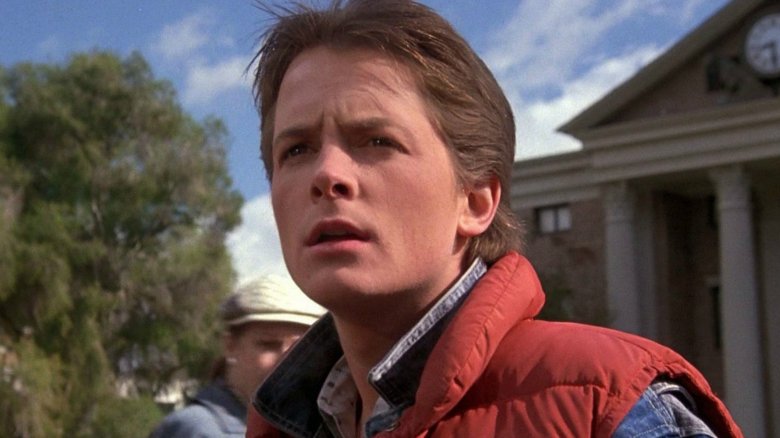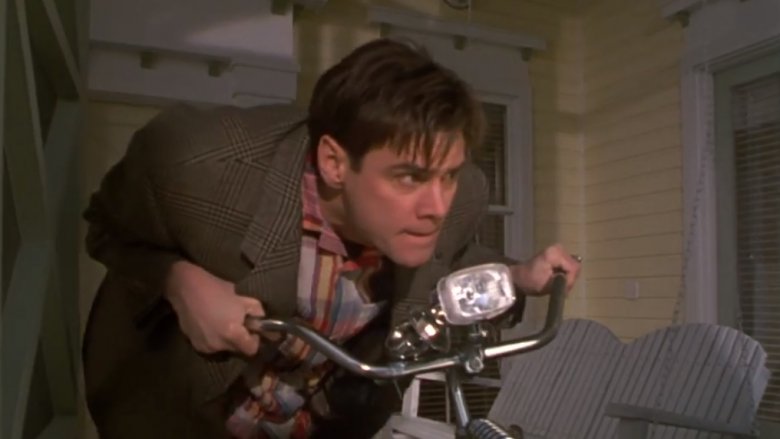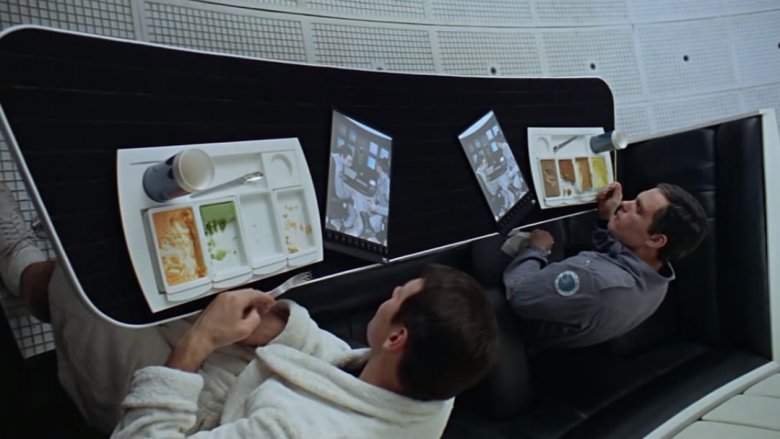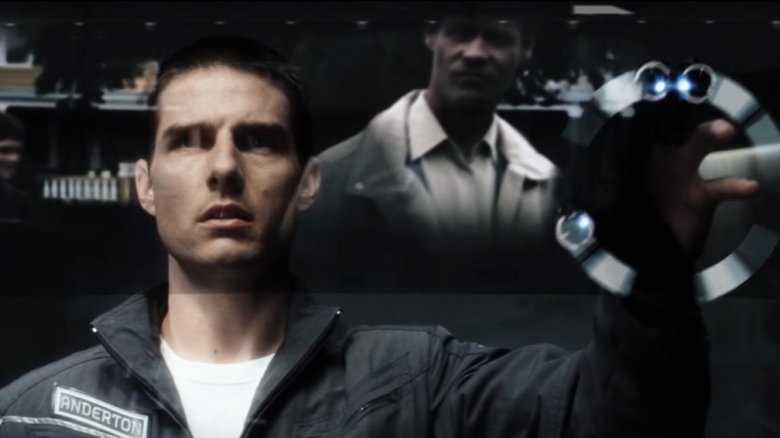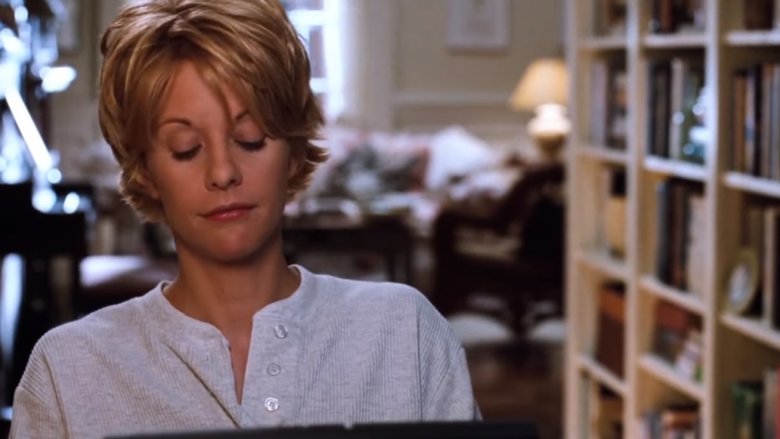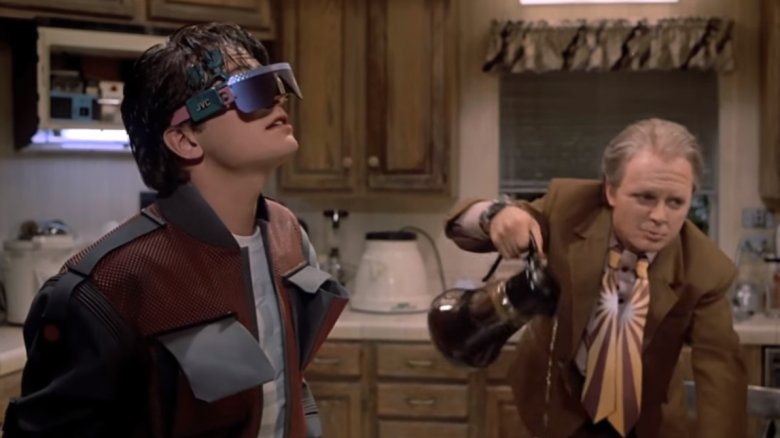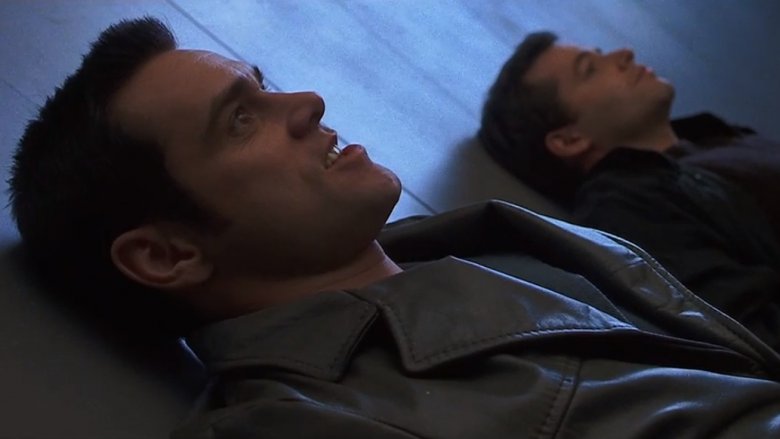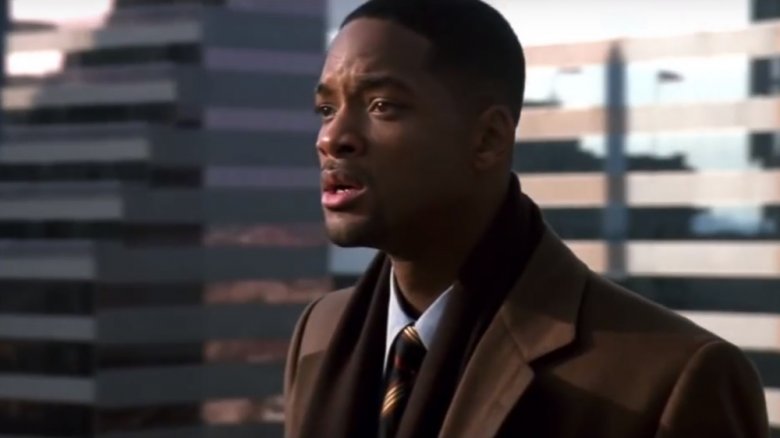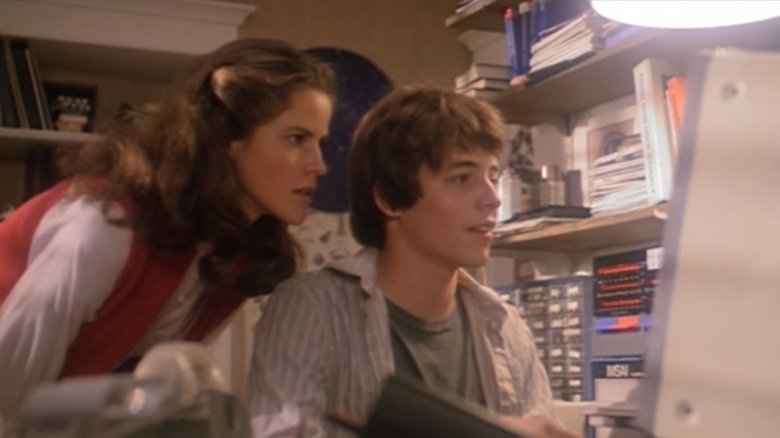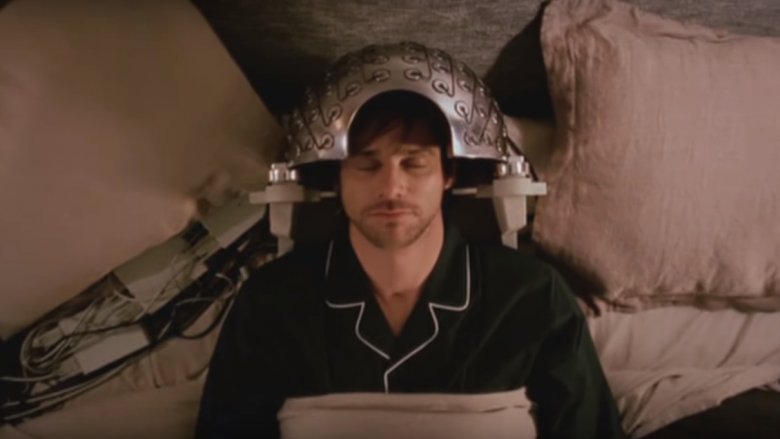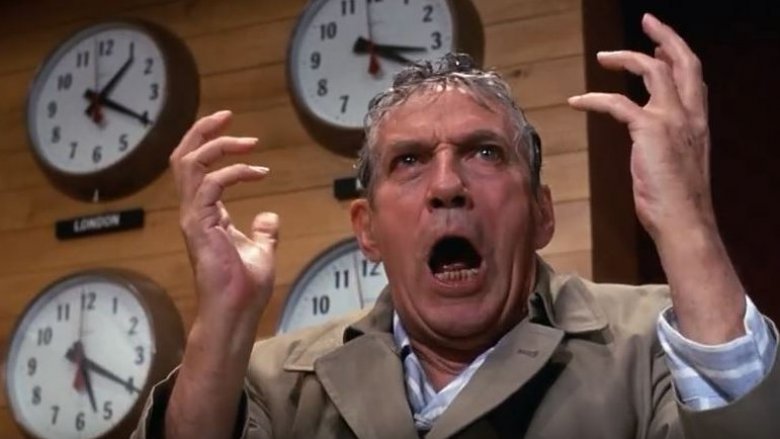Movies That Accurately Predicted The Future
We're probably never going to find a planet filled with giant blue cat people, we've thus far avoided a mass ape uprising, and asking passersby on the street if you're trapped in The Matrix isn't going to get you anywhere other than maybe a padded cell. For the most part, cinematic visions of the future are a little out of step with reality, and that's usually how we like 'em. Offering us a window into a world we never would have dreamed of and allowing our imaginations to run wild is part of what makes movies so special. Sometimes, nonsensical escapism is just what the doctor ordered.
But occasionally, the prophets and soothsayers of the silver screen get things surprisingly right. Some movies have introduced us to innovative gadgets decades before they become part of our lives, others have predicted major trends and cultural shifts, and others still have accurately foretold various developments in science, technology, and society at large — both positive and negative ones. The extent to which movies actually predict the future is open to debate. Which storytellers are just particularly savvy fortune tellers, and which futuristic developments have been directly inspired by entertainment? In any case, some movies get it right on the money where others miss the mark. These are the ones that got it right.
The Truman Show is basically all of our lives
Released long before reality television became the unstoppable cultural behemoth it is now, The Truman Show told the unlikely story of a good-natured insurance salesman who happened to be the oblivious star of a 24-hour TV show. Everything from Truman's first kiss to the cereal he eats for breakfast is broadcast round the clock to an adoring audience of millions. Sound vaguely familiar?
Peter Weir's satirical dramedy might've seemed like a high-concept flight of fancy back in 1998, but the extent to which it would end up mirroring our own reality is kind of scary — and a total surprise to most of the production's key players, according to Vanity Fair. The reality TV explosion was just around the corner, and Truman's story now feels less like a send-up of celebrity culture and more like a gloomy harbinger of things to come.
Even more eerie is how the movie predated our collective impulse to document and broadcast every mundane aspect of our lives online. With social media, reality programming has become limitless, personalized and entirely user-generated. You can keep up with the Kardashians as easily as you can keep up with your mom's friend Debra down the street. We're all Truman now, in a way — only we seem to be willing participants in the performative faux-reality Truman tries to escape. And Ed Harris probably isn't micro-managing our lives from a hidden control booth on the Moon, but you never really know.
Tablet computing in 2001: A Space Odyssey
The late, great Stanley Kubrick's mind never seemed like it was of this Earth, so the notion that he might have jumped 50 years into the future at some point, had a look around, and then went back to sprinkle new technology throughout one of his films isn't all that far-fetched. It would definitely make 2001: A Space Odyssey's many accurate predictions a lot easier to explain.
We may have still had a ways to go in the year 2001, but it's astonishing how many of the little details this movie got essentially right about the world of the future. The movie's depiction of the "NewsPad" from Arthur C. Clarke's novel of the same name, for instance, looks and seems to function just like an iPad. There they are, 200 miles above the Earth, watching Netflix and laughing at memes, probably, while Steve Jobs was still going through puberty. They also use flat screen monitors, they make video calls, and HAL 9000 is basically Siri or Alexa — albeit a much more calculating and murderous version.
Then there's the movie's depiction of space tourism. That sector might not have developed as quickly as Kubrick and Clarke envisioned, but it's well on its way, according to CBC. Commercial space shuttles, orbital tourism, and space hotels are being developed by private companies. And 2001 showed us all this before humans had even landed on the Moon.
Minority Report's vision of 2054 is awfully familiar
The late, great Philip K. Dick is another creator whose mind seemed to exist on a plane of existence almost entirely alien to our own, and Steven Spielberg brought his visionary short story to the big screen with grace in 2002. He consulted a crack team of futurists and forward-thinkers in doing so, according to Wired, so it's probably not too surprising that the movie got a few things right. It is surprising just how much of it already feels familiar — especially when we're still a few decades shy of 2054.
Tom Cruise flapping his hands about in front of a screen merely looked neat back in 2001. Now, it's almost like a demonstration reel for some of the gesture-based user interfaces we use in real life. Targeted advertising is another big one. A small and vaguely unsettling detail in the movie, it's now just an accepted reality of online life. We don't have our irises scanned while darting through the Gap before being personally marketed to, but use Facebook for a few minutes and you'll basically get the virtual equivalent.
Then there's predictive policing. In Minority Report, the police interpret the visions of three mutated humans in order to arrest possible culprits. Real life has yet to yield anything that sinister, but police have controversially begun experimenting with the use of algorithms to suggest where and when crimes will occur, who might commit them, and who might be victimized. What could possibly go wrong...
You've Got Mail predicted our Tinder obsession
The lengthy, carefully considered emails exchanged by Tom Hanks and Meg Ryan in 1998's You've Got Mail might seem a world away from the impersonal swipe culture that has come to define modern dating, but those two lovebirds were engaging in the unique anxiety and strangeness of romantic interaction online before almost anyone.
You've Got Mail came out at a time when those looking for love and companionship were mostly still doing it the old fashioned way — stealing slow-motion glances at each other in a bookstore while Cyndi Lauper played in their heads simultaneously, before working up the courage to walk over and actually speak to each other with their mouths. Tinder was something you used to start a fire, and anonymous digital communication seemed like an entirely novel way to meet a potential romantic partner.
Nowadays, online dating is so ubiquitous that You've Got Mail is basically a 19th-century Jane Austen novel. It almost seems like an origin tale for the state of today's dating world, even if a realistic modern-day equivalent would likely involve Tom Hanks sending Meg Ryan a shirtless picture of himself within a few minutes. And that's being modest.
Back to the Future II's 2015 predictions were pretty heavy, doc
Back to the Future II didn't get everything right — flying cars and hoverboards still aren't exactly commonplace — but its vision of Hill Valley in 2015 is still mightily impressive in its accuracy. Provided you ignore some of the more glaringly tacky retro-futurist indulgences — the double-necktie, for one — you'd have had a hard time finding a more prescient window into the future in 1989.
Among the more striking predictions screenwriter Bob Gale and company got right, as outlined by The Guardian, were proto-Google Glass/Oculus Rift VR headsets (seen in use in the McFly home), the ubiquity of mobile payments and flat-screen TVs, and our obsession with '80s nostalgia. There's also the holographic advertisement for Jaws 19 seen in the town square, which seemed to anticipate the 3-D movie craze we're still in the midst of, and perhaps most uncanny is the almost-spot-on prediction that the Chicago Cubs would win the World Series in 2015 after a 108-year drought. It happened a year later in reality, so whatever time machine the filmmakers were using obviously still had a few kinks to work out, but still.
Was The Cable Guy really all that crazy?
Streaks don't get much hotter than what Jim Carrey had going in the early '90s. Hits like The Mask and Dumb and Dumber had turned him into the most bankable star around, and it seemed he could do no wrong. In this climate, Carrey's weird, pitch-black turn in The Cable Guy was seen as a bit of a misstep. Critics and audiences didn't really go for it, and it underperformed financially. Nowadays it's a celebrated cult classic, offering a tantalizing glimpse into Carrey's well-rounded potential as a performer. But that's not the only thing the movie accurately foresaw. Carrey's character Chip might have been a demented creep, but there's a scene toward the end where he comes across as the sanest guy in the room — or more accurately, the sanest guy on the gigantic, rain-soaked satellite dish.
In the scene in question, Chip launches into a prophetic rant about the future of home entertainment and online interconnectivity. He goes on about how every home in America will "integrate their television, phone and computer," and how you'll be able to "do your shopping at home" while playing Mortal Kombat. In 1996, when the internet was still in its relative infancy, Chip's rant just seemed right at home in his particular wheelhouse of crazy. Today, over 20 years later, it's just the world we live in. Go ahead and watch the movie on your phone for maximum effect.
Enemy of the State was right about the enemy
According to internal emails from the NSA obtained by Buzzfeed News, agency employees weren't too happy to see themselves portrayed as villains in this 1998 Will Smith vehicle, thinking it highly inaccurate and damaging to their reputation. Indeed, to the public at the time, the notion that intelligence agencies could take control of any camera in the country and listen in on any phone call probably seemed like the kind of bonkers, over-the-top fabrication reserved solely for schlocky Hollywood blockbusters. But as Edward Snowden's 2013 leaks made clear, the movie actually predicted the rise of America's surveillance state with startling accuracy.
Snowden revealed that the NSA had been monitoring the digital communications of American citizens since at least 2001. This included pulling private user data from huge tech companies, collecting phone records, intercepting text messages, and potentially spying on foreign governments. Suddenly, Enemy of the State's plot — a group of NSA agents using an array of incredible surveillance capabilities to track down and silence a congressman who might expose their misdeeds — didn't seem all that far-fetched.
The cyberterror of WarGames
Before baby-faced Matthew Broderick was sticking it to the man by playing hooky and annoying anyone who got in his way, here he was dabbling in teenage rebellion of a much more dire and potentially global sort. In 1983's WarGames, he plays a young hacker who unwittingly connects with a military supercomputer and starts a game of Global Thermonuclear War, triggering potentially catastrophic results. Way to go, Bueller!
Nowadays we're all too familiar with the dangers of hacking, cyberwarfare, and the potential for cyber interference by nefarious outside forces, but back in 1983 this was merely the stuff of science fiction, and the World Wide Web wasn't even a thing. WarGames offered a glimpse of how things could go very wrong, very fast in that largely unexplored domain, as well as foretelling our over-reliance on technology and the advancement of artificial intelligence, according to the AV Club. It may be charmingly dated now in a lot of ways, but those ideas were way ahead of their time.
Eternal Sunshine had a lot on its mind
Jim Carrey's third appearance here begs the question: What does he know that we don't? The guy seems to be living at least a decade on from the rest of us at all times, figuratively speaking, and his ability to choose projects that illuminate the road ahead is so suspect at this point that you should probably be on the lookout for magical masks and rogue pet detectives over the coming years.
Eternal Sunshine of the Spotless Mind's premise is as barmy as it is brilliant. When their relationship starts to disintegrate, an estranged couple undergoes a procedure to erase their memories of each other. It's not just heartbroken romantics who use the process — among those seen waiting for the procedure, as IndieWire points out, are a woman grieving over a dead pet, and someone else clutching a box of sporting trophies.
And wouldn't you know it, by early 2017 a team of scientists in the real world had developed a successful proof of concept on mice for erasing traumatic memories in the brain. According to Professor Sheena Josselyn of Toronto University (via The Independent), they're able to determine where in the brain a specific memory resides and "decrease the activity in these cells," and they hope the method will one day be used to treat people suffering from PTSD and addiction. Those looking for a quick fix to get over a lost love don't seem to be a priority.
Network was prescient as hell
Released in 1976, Network has lost none of the zeal or urgency it possessed back then — if anything, screenwriter Paddy Chayefsky's concerns about corporate greed and the state of broadcast news are more relevant now than they've ever been. Network wasn't so much a critique of television and the news media landscape of the time as it was a prophetic warning about what was just around the corner, and few could have known just how frighteningly clairvoyant it was.
Even those who've never seen the movie might be familiar with that iconic "Mad as hell" rant. Delivered by news anchor Howard Beale (Peter Finch) in the midst of a mental breakdown live on air, it proved so popular with audiences that Beale's network gives him his own trashy TV show to continue manically espousing these scattered views to an enraptured audience. Outrageous at the time, this conceit almost seems quaint today.
"Tabloid TV" wouldn't rear its ugly head until the late '80s, according to Business Insider, and eventually so-called shock-jock politicians, podcasters, and news personalities would start dominating the airwaves. Writing about the movie in 2000, Roger Ebert wondered if Chayefsky could have possibly anticipated the emergence of figures like Jerry Springer and Howard Stern when he created Howard Beale. You can add Glenn Beck, Alex Jones, and any other opinionated crackpot with a YouTube channel to that list.
